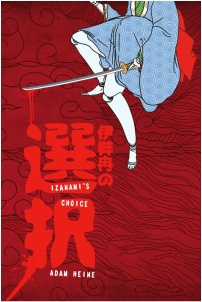
It's primarily a combination of two what-ifs:
- What if Charles Babbage had successfully completed his difference engine and analytical engine designs? (This is essentially the same what-if behind The Difference Engine by Gibson and Sterling.)
- What if evolutionary programming had been discovered around the same time?
The latter requires a variety of factors, including that Babbage chatted with Charles Darwin and came away with programmatic ideas and that 19th-century logicians figured out how to codify reasoning as mathematic deduction--not probable, but plausible.
Evolutionary programming is the idea of pitting competing parameters or programs against each other to achieve a certain goal (like getting a computer to handle facial recognition). Those parameters that perform best are then modified further and tested against each other again. This process is repeated until you have a programmatic solution to otherwise difficult problems.
The key idea behind Izanami's Choice, then, is that this method was used with the analytical engines to rapidly improve the design of the engine's programs and even the engine itself. The engine was improved to the point where it could evaluate the results automatically, and it was then improved further to where it could revise the programs itself as well. When that loop was closed, the engine would become capable of revising and improving upon itself at a rapid rate--a robotic singularity.
Of course, the novella doesn't have a big old infodump like this in it, but you asked, and I do love talking about worldbuilding!
You can order your copy today!

 RSS Feed
RSS Feed